英语课程一日计划表
小学生一天上学的作息时间计划表英语
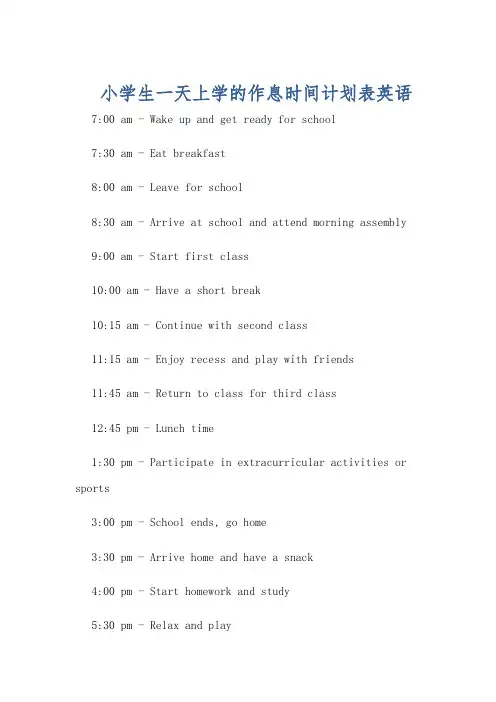
小学生一天上学的作息时间计划表英语7:00 am - Wake up and get ready for school7:30 am - Eat breakfast8:00 am - Leave for school8:30 am - Arrive at school and attend morning assembly9:00 am - Start first class10:00 am - Have a short break10:15 am - Continue with second class11:15 am - Enjoy recess and play with friends11:45 am - Return to class for third class12:45 pm - Lunch time1:30 pm - Participate in extracurricular activities or sports3:00 pm - School ends, go home3:30 pm - Arrive home and have a snack4:00 pm - Start homework and study5:30 pm - Relax and play6:30 pm - Eat dinner with family7:00 pm - Take a shower and get ready for bed 8:00 pm - Read a book or have some quiet time 9:00 pm - Go to bed早上7点起床并准备上学早上7:30 - 吃早餐早上8点 - 离开去学校早上8:30 - 到达学校并参加早晨集会早上9点 - 开始第一堂课早上10点 - 休息一会儿早上10:15 - 继续第二堂课早上11:15 - 享受休息时间并和朋友一起玩中午11:45 - 返回教室上第三堂课下午12:45 - 午餐时间下午1:30 - 参加课外活动或运动下午3点 - 放学,回家下午3:30 - 回家并吃点零食下午4点 - 开始做作业和学习下午5:30 - 放松和玩耍晚上6:30 - 和家人一起吃晚餐晚上7点 - 洗澡并准备睡觉晚上8点 - 读书或安静地放松晚上9点 - 睡觉。
英语学习计划表精选5篇
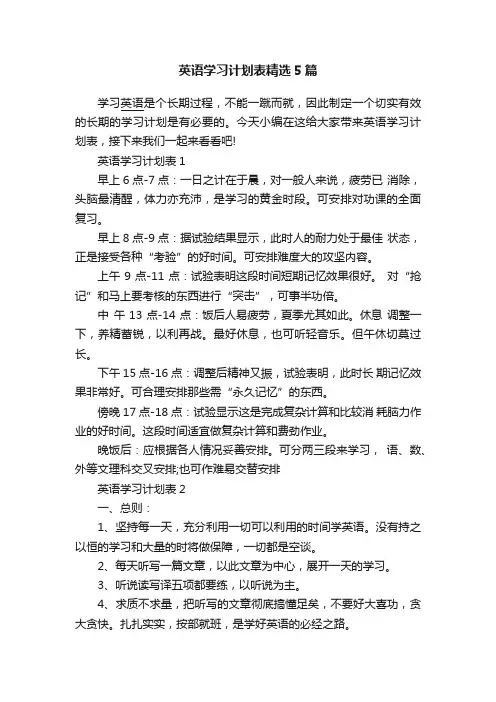
英语学习计划表精选5篇学习英语是个长期过程,不能一蹴而就,因此制定一个切实有效的长期的学习计划是有必要的。
今天小编在这给大家带来英语学习计划表,接下来我们一起来看看吧!英语学习计划表1早上6点-7点:一日之计在于晨,对一般人来说,疲劳已消除,头脑最清醒,体力亦充沛,是学习的黄金时段。
可安排对功课的全面复习。
早上8点-9点:据试验结果显示,此时人的耐力处于最佳状态,正是接受各种“考验”的好时间。
可安排难度大的攻坚内容。
上午9点-11点:试验表明这段时间短期记忆效果很好。
对“抢记”和马上要考核的东西进行“突击”,可事半功倍。
中午13点-14点:饭后人易疲劳,夏季尤其如此。
休息调整一下,养精蓄锐,以利再战。
最好休息,也可听轻音乐。
但午休切莫过长。
下午15点-16点:调整后精神又振,试验表明,此时长期记忆效果非常好。
可合理安排那些需“永久记忆”的东西。
傍晚17点-18点:试验显示这是完成复杂计算和比较消耗脑力作业的好时间。
这段时间适宜做复杂计算和费劲作业。
晚饭后:应根据各人情况妥善安排。
可分两三段来学习,语、数、外等文理科交叉安排;也可作难易交替安排英语学习计划表2一、总则:1、坚持每一天,充分利用一切可以利用的时间学英语。
没有持之以恒的学习和大量的时将做保障,一切都是空谈。
2、每天听写一篇文章,以此文章为中心,展开一天的学习。
3、听说读写译五项都要练,以听说为主。
4、求质不求量,把听写的文章彻底搞懂足矣,不要好大喜功,贪大贪快。
扎扎实实,按部就班,是学好英语的必经之路。
5、把零碎的时间充分利用起来学英语,不断地重复。
6、听写是个学习英语的好方法,要继续加强。
7、早睡早起学英语。
8、抓住一套教材足矣,不要盲目的更换教材。
9、每天学习英语必须要有详细可行的计划,必须坚决执行,没有任何借口。
10、相信自己,一定能够学好英语。
二、分则:(一)听力:2、早晚都随身带mp3,一有空闲时间就反复听这篇短文,直到听烂为止。
优秀英语学习计划表
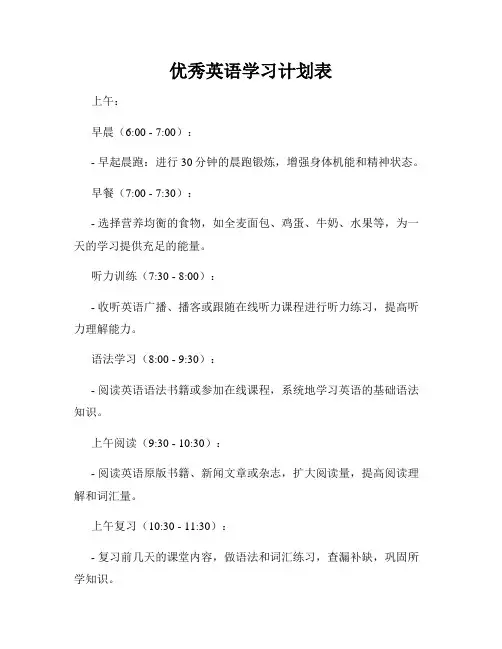
优秀英语学习计划表上午:早晨(6:00 - 7:00):- 早起晨跑:进行30分钟的晨跑锻炼,增强身体机能和精神状态。
早餐(7:00 - 7:30):- 选择营养均衡的食物,如全麦面包、鸡蛋、牛奶、水果等,为一天的学习提供充足的能量。
听力训练(7:30 - 8:00):- 收听英语广播、播客或跟随在线听力课程进行听力练习,提高听力理解能力。
语法学习(8:00 - 9:30):- 阅读英语语法书籍或参加在线课程,系统地学习英语的基础语法知识。
上午阅读(9:30 - 10:30):- 阅读英语原版书籍、新闻文章或杂志,扩大阅读量,提高阅读理解和词汇量。
上午复习(10:30 - 11:30):- 复习前几天的课堂内容,做语法和词汇练习,查漏补缺,巩固所学知识。
午餐(11:30 - 12:30):- 摄入营养丰富、均衡的午餐,含有蛋白质、蔬菜和谷物,以保持精神和体力。
下午:口语练习(12:30 - 14:00):- 参加英语口语俱乐部、交流活动或与英语母语者进行交流,提高口语流利度和表达能力。
下午学习(14:00 - 16:00):- 学习英语课程内容,完成作业,自主阅读相关教材,参与讨论与互动。
单词记忆(16:00 - 16:30):- 复习之前学过的单词,并通过使用记忆法技巧,例如使用闪卡、联想或背诵,巩固记忆。
阅读理解(16:30 - 17:30):- 阅读英语文章,并进行理解与分析,培养阅读能力和快速获取信息的技巧。
晚间:晚餐(17:30 - 18:30):- 选择有营养的晚餐,摄入适量的蛋白质、蔬菜和水果,保证晚上学习的精力和专注度。
写作练习(18:30 - 19:30):- 完成每日的写作练习,可以是日记、文章、翻译等,提高写作表达的能力和语法应用。
自主学习(19:30 - 20:30):- 根据个人英语学习需求,选择自学相关主题的课程或参考教材,进行个性化学习。
复习与总结(20:30 - 21:30):- 复习当天学习的知识点,总结掌握情况,做错题的再次强化练习,强化记忆效果。
英语一日三餐计划表
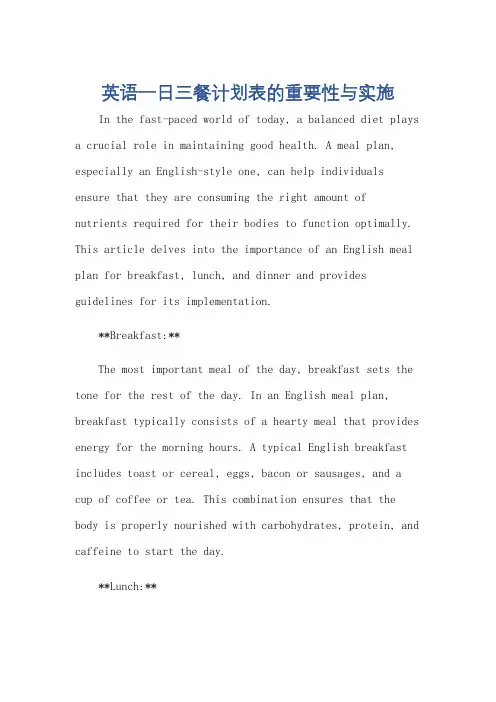
英语一日三餐计划表的重要性与实施In the fast-paced world of today, a balanced diet plays a crucial role in maintaining good health. A meal plan, especially an English-style one, can help individuals ensure that they are consuming the right amount ofnutrients required for their bodies to function optimally. This article delves into the importance of an English meal plan for breakfast, lunch, and dinner and provides guidelines for its implementation.**Breakfast:**The most important meal of the day, breakfast sets the tone for the rest of the day. In an English meal plan, breakfast typically consists of a hearty meal that provides energy for the morning hours. A typical English breakfast includes toast or cereal, eggs, bacon or sausages, and a cup of coffee or tea. This combination ensures that the body is properly nourished with carbohydrates, protein, and caffeine to start the day.**Lunch:**Lunch is a meal that bridges the gap between breakfast and dinner. In the English meal plan, lunch is often alight meal that provides energy for the afternoon. Sandwiches, salads, or soups are common choices for lunch. These options provide essential nutrients like carbohydrates, proteins, and vitamins without being too heavy.**Dinner:**Dinner is the largest meal of the day and should provide the body with all the nutrients it needs for the evening and overnight hours. In an English meal plan, dinner typically consists of a main course, such as meat, fish, or vegetables, accompanied by potatoes or rice. This combination ensures that the body gets enough protein, carbohydrates, and other essential nutrients.**Implementing an English Meal Plan:**Implementing an English meal plan can be challenging, especially for those who are not accustomed to it. However, with a bit of planning and effort, it can become a habit that benefits one's health. Here are some tips to help you implement an English meal plan:1. **Plan Ahead:** Prepare a meal plan for the week, taking into account your dietary requirements and preferences. This will help you stay organized and avoidlast-minute decisions about what to eat. 2. **Stock Up on Ingredients:** Make a list of the ingredients you need for the week and shop accordingly. This will ensure that you have everything you need to prepare your meals. 3. **Cookin Bulk:** Preparing larger portions of meals and storing them for later can save time and effort. This way, you can enjoy your meals even when you're busy or tired. 4.**Experiment with Recipes:** Don't be afraid to try new recipes and experiment with different combinations of ingredients. This will help you find meals that you enjoy and that are also nutritious. 5. **Drink Plenty ofFluids:** Remember to stay hydrated throughout the day. Drinking plenty of water, tea, or coffee can help you stay refreshed and maintain good health.In conclusion, an English meal plan for breakfast, lunch, and dinner can provide a balanced and nutritiousdiet that is essential for maintaining good health. By planning ahead, stocking up on ingredients, cooking in bulk, experimenting with recipes, and staying hydrated,individuals can easily implement this meal plan and enjoy its benefits.。
英语一天的时间计划表
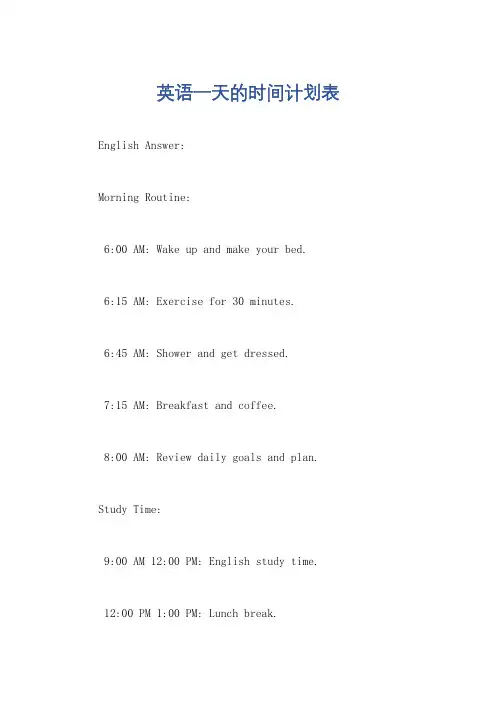
英语一天的时间计划表 English Answer:Morning Routine:6:00 AM: Wake up and make your bed.6:15 AM: Exercise for 30 minutes.6:45 AM: Shower and get dressed.7:15 AM: Breakfast and coffee.8:00 AM: Review daily goals and plan.Study Time:9:00 AM 12:00 PM: English study time.12:00 PM 1:00 PM: Lunch break.Afternoon Activities:1:00 PM 2:30 PM: Immersive English activity (e.g., watching English movies, reading English books)。
2:30 PM 4:00 PM: Work on English project or assignment.4:00 PM 4:30 PM: Break and snack.Evening Routine:5:00 PM 6:00 PM: Dinner and relaxation.6:00 PM 7:00 PM: Free time (e.g., hobbies, socializing)。
7:00 PM 8:00 PM: Review English vocabulary and grammar.8:00 PM 9:00 PM: Prepare for the next day (e.g., layout clothes, pack lunch)。
9:00 PM: Bedtime.Additional Tips:Set realistic goals and try to stick to the schedule as much as possible.Make sure to take breaks and reward yourself for your progress.Find an English study partner or tutor for accountability and support.Immerse yourself in English as much as possible by watching, listening, and reading English content.中文回答:每日英语时间表。
一日计划表英语
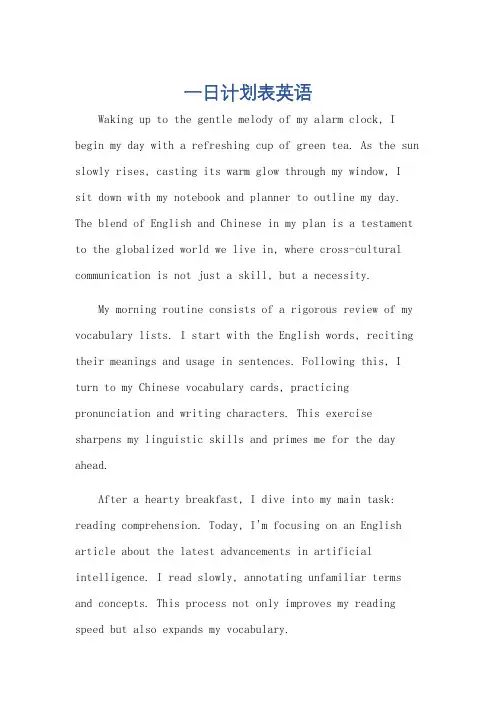
一日计划表英语Waking up to the gentle melody of my alarm clock, I begin my day with a refreshing cup of green tea. As the sun slowly rises, casting its warm glow through my window, Isit down with my notebook and planner to outline my day. The blend of English and Chinese in my plan is a testament to the globalized world we live in, where cross-cultural communication is not just a skill, but a necessity.My morning routine consists of a rigorous review of my vocabulary lists. I start with the English words, reciting their meanings and usage in sentences. Following this, I turn to my Chinese vocabulary cards, practicing pronunciation and writing characters. This exercise sharpens my linguistic skills and primes me for the day ahead.After a hearty breakfast, I dive into my main task: reading comprehension. Today, I'm focusing on an English article about the latest advancements in artificial intelligence. I read slowly, annotating unfamiliar terms and concepts. This process not only improves my reading speed but also expands my vocabulary.In the afternoon, I switch to Chinese, reading aclassic novel from the Ming dynasty. The rich vocabulary and intricate sentence structure challenge me to think critically and analyze the text deeply. This exercise helps me appreciate the nuances of the Chinese language and its cultural heritage.As evening approaches, I take a break to enjoy a cup of coffee while listening to an English podcast on global affairs. This activity broadens my horizons and exposes me to different perspectives on world issues.Before retiring for the night, I spend some timewriting in both languages. I start by jotting down my thoughts in English, focusing on clarity and conciseness. Then, I translate my ideas into Chinese, paying attention to the flow and rhythm of the language. This exercise helps me hone my writing skills and enhances my understanding of the subtleties of both languages.Throughout the day, I make sure to incorporate speaking practice as well. I engage in conversation with native speakers whenever possible, using both English and Chinese.This interaction helps me improve my pronunciation, fluency, and cultural awareness.In conclusion, my day is a blend of English and Chinese, reflecting the diverse linguistic landscape of my life.This blend not only enhances my language skills but also broadens my cultural horizons. As I continue to learn and grow, I cherish the opportunity to engage with these two languages and the rich cultures they represent.**一日学习生活的融合:中英双语交织**随着闹钟的轻柔旋律唤醒我,我开始了一天的生活,伴随着一杯清新的绿茶。
英语一天的时间计划表
英语一天的时间计划表English Answer:Morning:7:00 AM: Wake up, shower, and get dressed.7:30 AM: Breakfast and coffee.8:00 AM: Study English grammar and vocabulary.9:00 AM: Practice English listening and speaking.10:00 AM: Break.Afternoon:10:30 AM: Read an English book or article.11:30 AM: Write in English (journaling, stories, etc.)。
12:30 PM: Lunch.1:30 PM: Watch an English movie or TV show.2:30 PM: Practice English pronunciation.Evening:3:30 PM: Break.4:00 PM: Study English idioms and slang.5:00 PM: Review the day's English lessons.6:00 PM: Dinner.7:00 PM: Free time (relaxation, hobbies, etc.)。
9:00 PM: Bedtime.Night:10:00 PM: Listen to English podcasts or audiobooks.11:00 PM: Sleep.Additional Tips:Find a language partner or tutor for practice and conversation.Immerse yourself in English by listening to music, watching movies, and reading books.Use English learning apps and resources.Set realistic goals and reward yourself for progress.Be consistent with your practice and don't give up easily.中文回答:早上:7:00 AM,起床、洗漱、穿衣。
英语一天的计划表简单又好看
英语一天的计划表简单又好看英文回答:As I wake up in the morning, I start my day by checking my phone for any important messages or notifications. Then, I head to the kitchen to make myself a cup of coffee and prepare a light breakfast. While enjoying my breakfast, I like to listen to some upbeat music to energize myself for the day ahead.After breakfast, I usually spend some time reviewing my to-do list and prioritizing my tasks. I find it helpful to break down my day into smaller chunks and allocate specific time slots for each task. This helps me stay focused and organized throughout the day.Once I have a clear plan in mind, I begin tackling my most important task of the day. For example, if I have a deadline for a report, I would start by gathering all the necessary information and outlining the structure of thereport. Then, I would allocate a certain amount of time to work on each section, ensuring that I stay on track andmeet the deadline.After completing my first task, I take a short break to recharge. This could involve going for a quick walk outside, stretching, or even just taking a few minutes to relax and clear my mind. I find that taking breaks helps improve my productivity and prevents burnout.Next, I move on to the next set of tasks on my list. These could be smaller tasks that require less time and effort, such as responding to emails, making phone calls,or organizing files. I try to complete these tasks efficiently, ensuring that I don't spend too much time on any one task and keep a steady pace.In the afternoon, I like to schedule some time for personal development or learning. This could involvereading a book, watching educational videos, or taking an online course. I believe that continuous learning is essential for personal growth and staying updated intoday's fast-paced world.Towards the end of the day, I start winding down and preparing for the evening. I tidy up my workspace, reviewmy accomplishments for the day, and make a note of any unfinished tasks that I need to carry over to the next day. This helps me maintain a sense of closure and ensures thatI start the next day with a clear mind.Finally, I like to spend some time doing activitiesthat help me relax and unwind. This could involve watchinga movie, spending time with loved ones, or pursuing a hobby. It's important to have a healthy work-life balance and take time for self-care.中文回答:当我早上醒来时,我会先检查手机上是否有重要的消息或通知。
小学生一天的作息时间计划表英语
小学生一天的作息时间计划表英语A Day in the Life of a Primary School Student: Daily ScheduleHave you ever wondered what a day in the life of a primary school student is like? Here, we will explore the typical schedule of a primary school student, from waking up in the morning to going to bed at night. Let's take a look at a sample daily schedule:6:30 am - Wake Up: The day starts bright and early for most primary school students. They wake up early to prepare for the day ahead. Some students may need a little bit of encouragement from their parents to get out of bed and start their day.7:00 am - Breakfast: It is important for primary school students to start their day with a nutritious breakfast. This meal provides them with the energy they need to focus and concentrate in class. Breakfast may include cereal, toast, fresh fruit, and milk.7:30 am - Getting Ready for School: After breakfast, students brush their teeth, wash their face, and get dressed in their school uniform. They also pack their bags with their books, notebooks, pencils, and other school supplies.8:00 am - School Commute: Most primary school students take the school bus to school. Some students may walk or bike to school if they live close by. Once they arrive at school, they line up with their classmates before heading to their classrooms.8:30 am - Morning Classes: The school day begins with morning classes, which typically include subjects like math, science, language arts, and social studies. Students listen to their teachers, participate in class discussions, and complete assignments and activities.10:30 am - Recess: This is a fun and important part of the day for primary school students. During recess, students have the opportunity to play outside, socialize with their friends, and take a break from their schoolwork. Some students may play on the playground equipment, while others may play sports or games.11:00 am - Mid-morning Classes: After recess, students return to their classrooms for more classes. These classes may include subjects like art, music, physical education, and computer science. Students engage in hands-on activities and creative projects.12:00 pm - Lunch: Time for lunch! Primary school students enjoy a healthy and delicious meal in the school cafeteria or in their classrooms. Lunch may include sandwiches, salads, fruits,vegetables, and milk. Some students may also bring lunch from home.1:00 pm - Afternoon Classes: The school day continues with afternoon classes, which focus on different subjects or topics. Students work on group projects, presentations, and experiments. Teachers may also review concepts and provide additional instruction.3:00 pm - After-School Activities: Many primary school students participate in after-school activities such as sports, clubs, tutoring, or music lessons. These activities allow students to pursue their interests, develop new skills, and socialize with their peers.5:00 pm - Homework and Study Time: After returning home from school, primary school students spend time completing homework assignments, studying for tests, and reviewing concepts from class. This time is important for reinforcing learning and developing good study habits.6:00 pm - Dinner: Students enjoy a family meal with their parents and siblings. Dinner is a time for conversation, relaxation, and bonding. Students may share stories about their day at school and discuss upcoming events or activities.7:00 pm - Free Time: After dinner, primary school students have some free time to relax and unwind. They may watch TV, play video games, read books, or spend time with their family. This time is important for rest and relaxation.8:30 pm - Bedtime Routine: As the day winds down, primary school students follow their bedtime routine. They take a bath, brush their teeth, change into their pajamas, and prepare for bed. Some students may read a book or listen to music before going to sleep.9:00 pm - Lights Out: It's time to go to bed and get a good night's sleep. Primary school students need plenty of rest to recharge their bodies and minds for the next day. Parents may tuck their children in, kiss them goodnight, and wish them sweet dreams.This is just a sample daily schedule of a primary school student. Each student's day may vary depending on their school, extracurricular activities, and personal preferences. However, the key components of a primary school student's day typically include classes, recess, meals, homework, and sleep. By following a consistent and balanced daily schedule, primary school students can succeed academically, socially, and emotionally.。
英语教学计划表共5篇小学英语教学计划安排表
英语教学计划表共5篇小学英语教学计划安排表英语教学计划表共1英语学习计划表早上6点-8点:一日之计在于晨,对一般人来说,疲劳已消除,头脑最清醒,体力亦充沛,是学习的黄金时段早上8点-9点:据试验结果显示,此时人的耐力处于最佳状态,正是接受各种“考验”的好时间可安排难度大的攻坚内容上午9点-11点:试验表明这段时间短期记忆效果很好对“抢记”和马上要考核的东西进行“突击”,可事半功倍正午13点-14点:饭后人易疲劳,夏季尤其如此休息调整一下,养精蓄锐,以利再战最好休息,也可听轻音乐但午休切莫过长下午15点-16点:调整后精神又振,试验表明,此时长期记忆效果非常好可合理安排那些需“永久记忆”的东西傍晚17点-18点:试验显示这是完成复杂计算和比较消耗脑力作业的好时间这段时间适宜做复杂计算和费劲作业晚饭后:应根据各人情况妥善安排早晚背英语单词效果都很好哦,词汇量是英语的重点,可以结合有效的记忆法和工具达到事半功倍的效果,我上次发现个学英语的利器“恒星英语学习网",网址是英语教学计划表共2英語暑假教學計畫表7月23日初一上Unit 1 Getting to Know You7月24日初一上Unit 2 Different Looks7月25日初一上Unit 3 Good Friends7月26日初一上Unit 4 Having 月27日7月28日7月29日7月30日7月31日8月01日8月02日8月03日8月04日8月05日8月06日8月07日8月08日8月09日8月10日8月11日8月12日期末測試初一下Unit 5 Our School Life Part A 初一下Unit 5 Our School Life Part B 初一下Unit 6 Our Local A 休息初一下Unit 6 Our Local B 期中測試初一下Unit 7 The Birthday A 初一下Unit 7 The Birthday B 初一下Unit 8 The seasons and the A 初一下Unit 8 The seasons and the B 休息期末測試英语教学计划表共3英语教学工作计划表【篇1:英语教学工作计划】八年级英语教学工作计划通过西湖教育集团教学模式的学习,感概万分,感受多多,受到的启示也更多,也产生了许多共鸣的地方。
